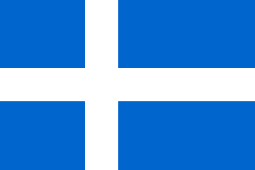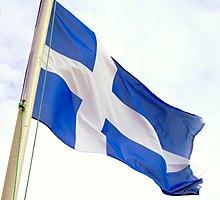Flag of Shetland
 | |
| Use | Civil flag |
|---|---|
| Proportion | 3:5 |
| Adopted | 2005 |
| Design | Azure, a cross argent in Scandinavian form |
| Designed by | Roy Grønneberg & Bill Adams |

The flag of Shetland was designed by Roy Grønneberg and Bill Adams in 1969. It was created to commemorate the 500th anniversary of the transfer of the islands from Denmark–Norway in the Kalmar Union to Scotland and the 500 years before as part of Norway.[1]
After almost forty years of unofficial use, the flag was formally granted by the Lord Lyon King of Arms, the heraldic authority of Scotland, on 1 February 2005,[2] just in time for the Island Games in July 2005 in Shetland.[3] The flag was blazoned azure, a cross argent in Scandinavian form, or in layman's speak, a white or silver Scandinavian cross on a blue field. As with all Scottish flags, its proportions and colour shades are not fixed.
The flag uses the colours of the flag of Scotland, but in the form of the Nordic cross in order to symbolise Shetland's historical and cultural ties with Scandinavia.
The flag is widely used privately by Shetlanders both on land and sea, and is now seen as a symbol of the special Shetland identity. In 2007 a "Shetland Flag Day" was introduced by the Council, who hope the day will be used to "celebrate all things Shetland".[4]
The flag is practically identical to the former unofficial national flag of Iceland (the Hvítbláinn) in use by Icelandic nationalist activists from 1897 until 1915, when it was in part abandoned due to its similarity to the Greek jack and the Swedish flag, which critics reasoned would be hard to tell apart at sea, a major issue in a time of war. The white and blue is still used by the Icelandic Youth Association.
